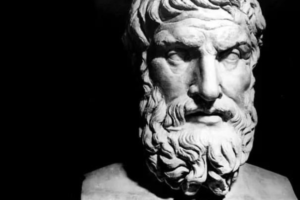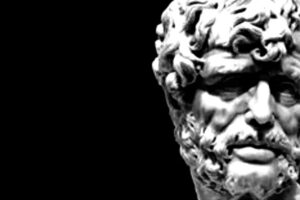One of the most revered emperors in Roman history, Marcus Aurelius, is best known for his interest in philosophy. He came from a wealthy family that was deeply intertwined with the politics of Rome. Marcus Aurelius studied hard as a child, picking up Latin and Greek, but he was most interested in the philosophy of Stoicism. He was heavily influenced by the writings of Epictetus, a man born into slavery who rose to become an advisor to Emperor Hadrian. Marcus’ words, which have survived for two thousand years, are a mainstay of Stoic thought and are often quoted throughout the Internet and in print. Epictetus, Seneca, and Marcus Aurelius have all had a profound effect on this ancient philosophy, but our focus in this article is on the one known as the Philosopher King, Marcus Aurelius. So, who was this man, and how did he help to shape Stoicism?
Marcus Aurelius Antoninus was born on April 26, 121 AD and died on March 17, 180 AD while leading a military campaign in present-day Austria. He was a Stoic philosopher and the emperor of Rome from 161 to 180 AD. Marcus was the last of the five emperors known as the “Five Good Emperors”, ruling a period of mostly tranquility and stability for the Roman Empire, though in almost constant warfare. He was the son of Marcus Annius Verus, the nephew and magistrate of Emperor Hadrian, and Domitia Calvilla. His mother and grandfather raised him when his father passed away when he was three.
Emperor Hadrian chose Marcus’ uncle, Antoninus Pius, as his new heir in 138 AD at the passing of his adopted son. Antoninus adopted both Marcus and his brother, Lucius. Later that year, Antoninus Pius succeeded Hadrian as emperor of Rome. This placed Marcus as the heir apparent. His adopted father taught him the nuances of politics and public administration. Marcus Aurelius assumed the position of leader of the senate in 140, the same year he married Faustina, his step-sister. He would occupy the position of Senate leader twice more during his lifetime. He gained greater responsibility and authority as the years went by, becoming a valuable source of support and guidance for emperor Antoninus. Marcus Aurelius also pursued his studies in philosophy and became intrigued by law.
Marcus Aurelius become the emperor of Rome upon the death of Antoninus in 161 AD. He served as co-emperor with his adopted brother, Lucius Verus. Together they saw intense military strife during their rule. Rome prevailed in their conflict with the Armenians and the Parthian Empire of the east.
Marcus was instrumental in winning the Marcomannic Wars. However, these German peoples became problematic realities for the Roman Empire. Although the persecution of Christians in the Roman Empire seems to have risen during his rule, it is unlikely that he was directly responsible for it because he was referred to as a “protector of Christians” in the early second century. Five to ten million people perished as a result of the Antonine Plague, which struck the Roman Empire in 165 or 166. In 169, Lucius Verus might have passed away from the plague. Marcus did not adopt an heir like some of his forefathers. His progeny included Commodus, his son, whose succession upon Marcus’ death has been a point of contention among historians, and Lucilla, who married Lucius.
In honor of Marcus Aurelius’ military triumphs, the city of Rome still houses his column and equestrian statue. Though he died in 180 AD, his writings concerning Stoicism survived and have been a major influence on authors, philosophers, kings, politicians, and common people to this day. Marcus Aurelius, though a competent military leader, guided Rome with his contemplative character and rationally-based reign. The Meditations is a book that contains a compilation of his ideas. The text is full of his life notes based on his Stoic philosophy.
His Teachings
Though Marcus Aurelius never openly taught Stoicism, like many of the other leading figures of this school of thought, his writing, in the form of journalistic notes to himself, survive. His journals, containing his contemplative notes to himself, contain much useful and pertinent information. There are many benefits to becoming Stoic and adopting it into your mindset.
In his writings, Marcus Aurelius warns us that we will encounter horrible people every day. We are all made up of tiny fragments of blood, bone, and breath; life is short, and our bodies will deteriorate. Death is nothing to be afraid of because it cannot harm us. But our minds are the most crucial aspect of who we are. Control your desires. Avoid worry about the present, or to become terrified of the future. We cannot ensure fame or money, but we can maintain a tranquil, injury-free state of mind, which is superior to both pleasure and suffering. Control of our thinking is freedom.
We shouldn’t obsess or guess on what people may say or do. Instead, only consider and express ideas that you do not find embarrassing to have others learn about. You will possess a certain level of greatness if you think honestly and with joy. Nothing is more priceless than a mind that strives for justice, honesty, moderation, tenacity, and the like. Be steadfast in your pursuit of the good. Individually, we can always find solitude in our own minds, according to Marcus Aurelius. We can achieve serenity and happiness if our minds are calm. We have limited influence on how people perceive us. But we should recognize goodness, if it still exists. Keep in mind that life is transient; one day we are alive, the next we are dead. Act morally, manage your time well, and be happy.
We should wake up every morning and conduct decent work, according to Aurelius. We should behave naturally and contribute to society without worrying about what people may think of us. Additionally, refrain from expecting or asking for compensation for your good efforts. Instead, content yourself with emulating a good fruit-bearing vine. Virtue pays for itself. Aurelius rejects retaliation and advises against mimicking injury. Because we are inconsequential, we should fulfill our obligations, behave morally, and avoid distraction by others because, in the context of all of space and time. Maintain mental control and positive thoughts.
He advocated tolerance and patience. Be patient since nature constantly transforms like wax. No matter what you do, people will criticize you; but, be understanding. Evil and difficult people will test our tolerance and patience, but we may maintain our happiness by managing our reaction to them. We should live in harmony with the environment and other people. No matter what you experience, keep a calm and collected mentality.
According to Marcus Aurelius, we ought to be reasonable, true, truthful, and composed. If someone accuses you of lacking virtue, refute their claims with your integrity and use humor to deter the worst individuals. Why do we prefer other people’s opinions over our own so frequently, but we love ourselves the most? Also keep in mind that both the best and the worst of human beings share the same end: they all turn to ashes. So instead of being arrogant, be humble. Die peacefully.
Influence
The influence of his Stoic thoughts in the notes he made for himself are wide ranging. The Vatican Library houses the earliest full manuscript copy that has survived, which is from the 14th century. Meditations was the favorite book of former President Bill Clinton. The Internet is full of Marcus’ quotes in the form of memes. Meditations, translated into numerous languages, is available throughout the world. Great leaders, thinkers, politicians, and people of all walks of life have benefited from his writings. His influence on Stoicism has been unparalleled and he is consider as one of the leading Stoic sages of all time.









Most Commented Posts